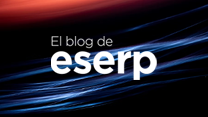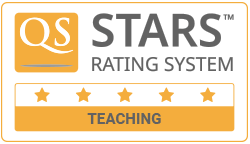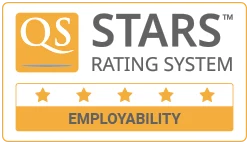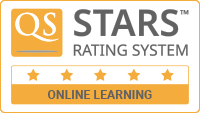Eserp offers a wide variety of applied methodologies that allow students to acquire practical and strategic skills to function in today’s professional environments. Among the methodologies applied are Case Study, Project Management Office (PMO), Skills Stacking, Flipped Class, Problem based Learning, Making Presentations, Agile Methodologies, Business Model Canvas, and Simulation and Role playing Methodology. All these methodologies are designed to adapt to the needs of an increasingly changing and demanding labour market, and allow young professionals to develop strategic and technical skills that will be of great use to them in their professional career.
QS Stars Rating certifies eserp digital business & law school as a model of educational excellence
Achieved 5 stars over 5
Skills Stacking
The skills stacking methodology is focused on the combination of knowledge and key skills that make the professional a figure of great added value in the work environment. In addition to obtaining new strategic knowledge, this collection of skills is also oriented towards professional and personal development and the discovery of new perspectives.
Flipped Class
With the flipped classroom methodology we propose to turn the traditional learning system upside down, students prepare the content before the sessions with the help of the virtual platform, prioritising in the classroom activities focused on interaction and participation.
Problem-based Learning
Learning through the search for complex solutions in groups is the basis of the problem-based learning methodology. The approach of a complex problem to be solved is the main vehicle that encourages the participation and motivation of students, and at the same time develops an essential soft skill: critical thinking.
Project Management Office (PMO)
More and more companies are deciding to “manage by projects” to achieve more complex business objectives. Based on this reality, we have created a methodology based on the simulation of professional roles focused on project management. Very much in line with the real professional environment, the Project Management Office (PMO) is a personalised methodology tutored by professional experts oriented to: > teamwork focused on specific objectives, > real projects with real companies, > the development of strategic capacity, resource optimisation, > analysis, management and implementation methods.
Case Study
Through real case studies, we are transported to current professional environments. A methodology based on learning by doing with a long history: it was created in 1914 at Harvard University and is still essential today in the development of strategic professional skills.
Business Model Canvas
Structured in nine elements, the Business Model Canvas allows you to design and shape a business model. An innovative business tool that allows you to project business ideas, collaborate with projects, test ideas, or even monitor factors such as innovation and risk.
Agile Methodologies
Flexibility is the fundamental basis of this methodology. It is committed to adapting the way of working to the conditions of the project, and moulding it according to the specific circumstances of the sector or the market. A flexible and dynamic work methodology that seeks to adapt to the needs of increasingly changing professional contexts.
Simulation Methodology and Role playing
Structured in nine elements, the Business Model Canvas allows you to design and shape a business model. An innovative business tool that allows you to project business ideas, collaborate with projects, test ideas, or even monitor factors such as innovation and risk.
Making presentations
Flexibility is the fundamental basis of this methodology. It is committed to adapting the way of working to the conditions of the project, and moulding it according to the specific circumstances of the sector or the market. A flexible and dynamic work methodology that seeks to adapt to the needs of increasingly changing professional contexts.





















